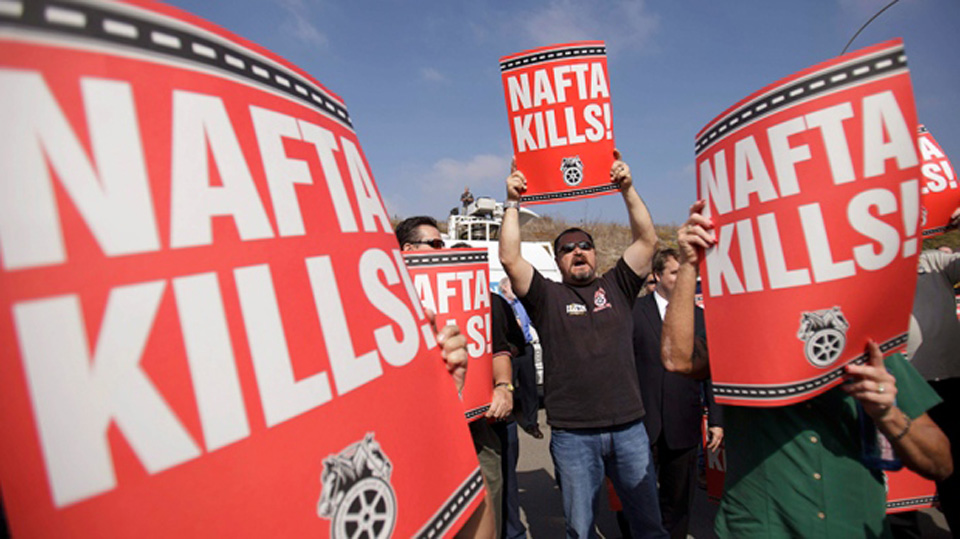
The Trump administration is circulating a draft outline of their policy objectives for the upcoming re-negotiation of the North American Free Trade Agreement (NAFTA). During the 2016 presidential campaign, Donald Trump’s denunciation of NAFTA was one of the pillars of his “populist” rhetoric, endearing him to workers in the Midwest who have seen their jobs outsourced.
However, in keeping with his post-election pattern, the substance of this proposal around trade falls short of the campaign bluster.
Far from “pulling out” of the controversial deal, according to Reuters, the Trump administration proposal calls for reform of value-added taxes as well as “calls for protections of digital trade and commerce, tougher intellectual property enforcement and requirements that state-owned companies operate in a commercial fashion.”
Another top goal is being able to put tariffs on Mexican and Canadian goods products if they pose “serious injury or threat of serious injury” to the profitability of U.S. companies.
In a statement, AFL-CIO President Richard Trumka characterizes the proposal as “tinkering around the edges.”
“This draft leaves standing the worst and most oppressive parts of NAFTA. It leaves in place the right of foreign investors to sue the U.S. in private tribunals in order to skirt health, safety and environmental laws… If the president wants to keep his promises, he needs to bring that same tough stance he had on the campaign trail to renegotiating America’s trade deals.”
Of course, and despite winning the votes of a plurality of union members, nothing Donald Trump has done in suggests that he is interested in considering the opinion of the president of the country’s largest labor federation. As recently as the day before the November election, Donald Trump has found himself on the wrong side of labor law.
In December, the AFL-CIO released “Blueprint on Rewriting NAFTA to Benefit Working People.” In it, they identify six ways NAFTA could be rewritten to ensure more “equitable outcomes for working families.”
Among the ideas the AFL-CIO highlights is a proposal to improve labor and environment side-treaties that were passed in the wake of NAFTA in order to “quiet NAFTA’s critics.” They want the side-treaties scrapped and stronger versions of them built into NAFTA itself. Given Trump’s aforementioned disrespect of his own workers and the selection of the most anti-environmental EPA Chief in history, Scott Pruitt, the chances of this seem slim.
One part of Trump’s plan that may please the AFL-CIO is the stated goal of “establishing rules that require government procurement to be conducted in a manner that is consistent with U.S. law and the administration’s policy on domestic procurement preferences.” In theory, it looks like Trump is advocating renegotiation of the procurement chapter that undermines “Buy American” laws.
The AFL-CIO has advocated for an outright deletion of this chapter. U.S. factories and workplaces would benefit from this move because, according to the blueprint, the U.S. government considers Canadian and Mexican goods and services as “American.” In theory, government contracts would then prioritize American business and benefit working families, but as with Donald Trump’s infrastructure plan, the devil is surely in the details.
Commerce Secretary Wilbur Ross, himself a billionaire, hopes to trigger the 90-day consultation period needed to open negotiations next week.












Comments